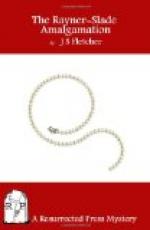“You observe,” said the chief quietly, “you can’t fail to observe that the writing in the register, is not the writing of the card pinned on the door of Number 27. They are quite different. The writing of Frank Herman in the register is in thick, stunted strokes; the writing on the card is in thin, angular, what are commonly called crabbed strokes. Yet it is supposed that Herman put that card outside his bedroom door. How is it, then, that Herman’s handwriting was thick and stunted when he registered at seven o’clock and slender and a bit shaky when he wrote this card at, say, half-past ten or eleven? Of course, Herman, or whatever his real name is, never wrote the line on that card, and never pinned that card on his door!”
The landlord opened his heavy lips and gasped: the landlady sighed with a gradually awakening interest. Amidst a dead silence the chief went on with his critical inspection of the handwriting.
“But now look at the signature of the man who called himself John Barcombe, of Manchester. You will observe that he signed that name in a great, sprawling hand across the page, and that the letters slope from left to right, downward, instead of in the usually accepted fashion of left to right, upward. Now at first sight there is no great similarity in the writing of that entry in the register and that on the card—one is rounded and sprawling, and the other is thin and precise. But there is one remarkable and striking similarity. In the entry in the register there are two a’s—the a in Barcombe, the a in Manchester. On the one line on the card found pinned to the door there are also two a’s—the a in please; the a in call. Now observe—whether the writing is big, sprawling, thin, precise; feigned, obviously, in one case, natural, I think, in the other, all those four a’s are the same! This man has grown so accustomed to making his a’s after the Greek fashion—a—done in one turn of the pen—that he has made them even in his feigned handwriting! There’s not a doubt, to my mind, that the card found on Herman’s door was written, and put on that door, by the man who registered as John Barcombe. And,” he added in an undertone to Allerdyke, “I’ve no doubt, either, that he’s the man of the Eastbourne Terrace affair.”
The landlord had risen to his feet, and was scowling gloomily at everybody.
“Then you are making it out to be murder?” he exclaimed sulkily. “Just what I expected! Never had police called in yet without ’em making mountains out of molehills! Murder, indeed!—nothing but a case of suicide, that’s what I say. And as this is a temperance hotel, and not a licensed house, I’ll be obliged to you if you’ll have that body taken away to the mortuary—I shall be having the character of my place taken away next, and then where shall I be I should like to know!”
He swung indignantly out of the room, and his wife, murmuring that it was certainly very hard on innocent people that these things went on, followed him. The police, giving no heed to these protests, proceeded to examine the articles taken from the dead man’s clothing. Whatever had been the object of the murderer, it was certainly not robbery. There was a purse and a pocket-book, containing a considerable amount of money in gold and notes; a good watch and chain, and a ring or two of some value.




